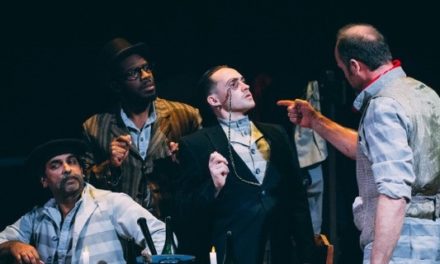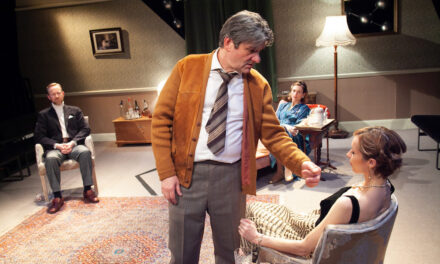The stage explodes with ihi (essential force) and aroha (love, empathy) in Unreel, the new work by Māori theatre company Te Rākau Hua O Te Wao Tapu (which translates as The Blossoming Fruit Tree of Our Sacred Grove). Set in the fictional Hīnaki Hotel and Gaming Lounge, this musical play written by Helen Pearse-Otene highlights ways in which pokie machines entrap their customers, destroy families and strip the money out of poor communities.
Te Rākau is one of the longest-running independent theatre companies in Aotearoa and celebrates its 35th anniversary this year. That doesn’t mean their work is stale, in fact it’s the opposite. The result of the direction by Te Rākau co-founder Jim Moriarty is a tight, disciplined ensemble cast who move together on the one breath, where every word is clear, the choreography precise, the storytelling heartwrenching.
Despite the seriousness of the kaupapa, Unreel is a playful, high energy show, spiked with biting satire, with no dull patches or sermonizing. The colourful, entertaining performance reflects the glitz and glamour fostered by the gambling industry to mask its predatory purpose. In the words of the Hīnaki’s manager, “Queen bee” Lilith (Hariata Moriarty), “the point of our enterprise is to liberate our customers from all of their money, and do it in such a way that they don’t even notice – and if they do, they actually enjoy the experience.”
The Hīnaki has just been re-built after a disastrous fire and Lilith is on a mission to re-launch the pub, aided by hard-working hospo staff Jinn (Kauia Moriarty) and Dev (Ari Kayvice). The highlight of the re-furbished hotel is a “world-first” new A.I. pokie machine named “Ol’ Scratch” (Tamati Moriarty), the brainchild of entertainment mogul Mr Dickens (Louis Tait), and his nerdy nephew Hades (Ryan Holtham). As a cartoony villain, Dickens is a sleazy parody of the amorality of corporate avarice, pursuing profit at all costs.

Tamati Moriarty as the A.I. pokie machine Ol’ Scratch in Unreel by Helen Pearse-Otene. Photo credit: Stephen A’Court.
The delightfully retro singing and dancing troupe Cherry and the Bells, with their expertly choreographed song and dance routines, provide the entertainment for the launch. The chorus of their signature number contains the warning that underpins the entire play: “The house will always win”. The play emphasizes how gambling addictions lead to whānau breakdown, and entrench poverty in the community.
While writing the script, Pearse-Otene researched the tactics used by the gambling industry to trick customers into believing they can escape their financial traps by winning big on the pokies. All of these insidious techniques are highlighted in the play: no clocks, low lighting so punters lose track of time, music that doesn’t compete with the pokie machine sound effects, air conditioning designed to keep punters awake and alert, cheap drinks till the customer is hooked. There are special arrangements to replace chairs where the customer pisses in their chair rather than lose their spot to go to the bathroom. This is theatre designed to provoke discussion, outrage, activism, social change.
Pearse-Otene’s dialogue sparkles with memorable lines. She has her finger on the pulse of human nature and the seductiveness of gambling’s promise of riches. Hīnaki literally means “eel trap” and the play shows different ways in which the characters are entrapped by the pub culture of drinking and gambling. Lilith uses fishing metaphors to describe the tactics: “Catch…gut…release”. We discover how gambling addiction caused the break-up of Jinn’s relationship with security guard Riha (Jeremy Davis). Kauia Moriarty poignantly portrays the desperate irony of Jinn’s position. Despite Riha’s gambling having wrecked her whānau and made her homeless, she needs her job at the Hīnaki to make ends meet. This shows how lives of people in lower socio-economic communities are controlled by corporate forces, so they are forced to “sell out” just to survive. Tamati Moriarty’s engaging performance as Ol’ Scratch is a timely reminder that the gaming industry is likely to benefit from new A.I. technologies, although the results of this A.I. experiment turn out to be unpredictable.

Regan Taylor as Pete in Unreel by Helen Pearse-Otene. Photo credit: Stephen A’Court.
At the heart of the play are moving monologues by gambling addicts Pete (Regan Taylor), Kali (Steffanie Gill) and Laylah (Janet Matehe). Here, the upbeat tempo pauses, the audience goes silent and listens intently, and the storytelling crushingly conveys the heartbreak of addiction.

Riha (Jeremy Davis) and Laylah (Janet Matehe) in Unreel by Helen Pearse-Otene. Photo credit: Stephen A’Court.
Another precious moment is the scene where the glamorous Cherry and the Bells singers drop their façade and have a down-to-earth chat about the destruction caused by gambling. The high-status boss Lilith’s story also has a gut-wrenching sting in the tail. In the end this is a story about the need to get back to whānau (extended family) values.
From the beautiful whaikōrero/welcome from Hariata Moriarty at the beginning, to the kōrero/forum at the end, the Marae Theatre form that Te Rakau pioneered 35 years ago has stood the test of time, blending marae and theatre rituals to create a satisfying package of mind-expanding entertainment. There’s a whānau atmosphere, enhanced by the presence of several of the director’s whānau onstage.
After the curtain call, the cast provide refreshments for the audience, who are invited to give responses. At the performance I attended there were two people from gambling addiction support organisations who spoke to the play’s value in creating awareness and education. There’s also a film version of the play to be used in communities as an educational tool. Te Rākau are a taonga (treasure) in Aotearoa’s theatre ecology, and their long-term commitment to social change through provocative theatre is inspiring.
Part of what makes Te Rākau so special is its commitment performing in communities that don’t often have access to theatre, communities where its themes are most relevant. Over the last two weeks, Unreel has toured around the lower North Island, performing in marae, community halls and schools in Porirua, Strathmore, Palmerston North, Masterton, Wainuiomata and the Hutt Valley. When I caught up with the show at Massey University’s Drama Lab, they had driven back from Masterton the night before and packed into the new venue in a few hours. Janis Chong Yan Cheng’s lighting design worked beautifully with Cara Louise Waretini’s colourful costumes to magically transform this cozy black box into a glittering casino-like atmosphere.
Pearse-Otene’s script exposes what appears to me a complete lack of ethics in the gambling industry. It’s not much of a stretch to see the similarities with the advertising industry, online marketing, social media firms harvesting algorithms, corrupt corporates, politicians with blatant conflicts of interest, and un-checked capitalism in general. It was Bertolt Brecht who wrote that the true criminals are not those who rob the bank, but the bankers who run it. I could imagine Brecht cheering from his grave. It seems to me that we don’t need the gambling industry at all, but the skillful storytelling of Helen Pearse-Otene, Jim Moriarty and Te Rākau theatre is needed more than ever.
This review was originally posted on Theatreview Re-posted with permission.
Te Rākau Hua O Te Wao Tapu presents Unreel by Helen Pearse-Otene
Directed by Jim Moriarty
Produced by Lisa Maule
Drama Lab, Massey University, Wellington 11-13 October 2024
This post was written by the author in their personal capacity.The opinions expressed in this article are the author’s own and do not reflect the view of The Theatre Times, their staff or collaborators.
This post was written by David O'Donnell.
The views expressed here belong to the author and do not necessarily reflect our views and opinions.


















